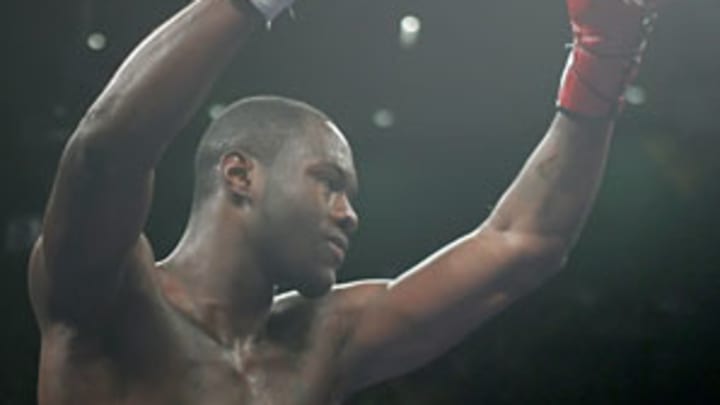Wilder, last American to win Olympic medal, continues slow rise


LONDON -- He is the American boxing man of mystery, a 6-foot-7, 217-pound heavyweight with Klitschko-like size, concussive power (23 knockouts in 23 professional fights) and an accomplished amateur pedigree (a 2008 Olympic bronze medal). So why, in a division starved for an American contender, are so few people talking about Deontay Wilder?
For starters, since turning pro in 2008, Wilder has kept a low profile. Fighting primarily in the south, Wilder has built a glossy record against low-level opponents. His last fight, against 36-year-old Owen Beck, was Beck's sixth loss in a row. Two fights before that, he handed 41-year old Marlon Hayes, who stands all of 5-foot-9, his sixth loss in a row.
Eric Gomez, the matchmaker for Golden Boy Promotions, says Wilder's inexperience -- he didn't start boxing until 2005 -- has forced the company to bring him along slowly.
"He was so raw," Gomez said. "You can tell right off the bat that he is very athletic. but he still didn't have some of the technique that some of the better young heavyweights did."
For the 26-year-old Wilder, adjusting to the slower, more methodical pace of professional boxing has been the biggest challenge.
"My first year or so in pros, I was a wild guy," Wilder said. "I was 'Wild Man Wilder.' Coming from the amateurs, where everything was three rounds and things happened so fast, it was hard. Now I am such a calm fighter."
Said Wilder's trainer, Jay Deas, "He doesn't fight like a heavyweight. He is a high motor guy. We're trying to keep that energy level, that high motor that he has got down, taking it back a gear, so he can see things a little clearer."
Indeed, over the last four years, those in Wilder's camp have seen significant improvements. Wilder has worked extensively on his jab, which for a heavyweight with his size and power (see: Klitschko, Wladimir) is an important set-up weapon.
"My jab is spectacular," Wilder said. "It's like a perfect rib with a touch of that homemade barbecue sauce. In my last fight against Beck, I beat him with the jab. Broke a couple of bones in his face with it."
One of the concerns with Wilder is stamina. None of his fights have lasted longer than four rounds and 18 of them have not gone beyond the second. Gomez says he has actively looked for journeymen fighters who can go deep into a fight but Wilder "keeps putting them down."
"When you are developing a young fighter, even in other weight classes, you want him to get rounds," Gomez said. "You want him to know what it feels like to have their shoulders and arms tire, to be breathing hard. You want them to know what it feels like to kind of get a second wind. All that stuff is very important. But he has that powerful right hand that can change a fight."
For his part, Wilder says he improves his stamina in training. During workouts -- speed bag, heavy bag, sparring -- he goes two rounds longer than his scheduled fight is.
"And he has sparred a lot of top guys," Deas said. "David Haye, Tomasz Adamek, Tony Thompson. He has also been in sparring situations where he has gone 12 rounds with 30-second breaks, mixing in sparring partners. I know a fight is different but once he is taken to that limit, I think he will do well."
On Saturday, Wilder (23-0) will face his stiffest test to date when he takes on heavy-handed Kerston Manswell (22-5) at Exposition Hall in Mobile, Ala. (10 p.m. ET, Fox Sports Net). Gomez says that by early next year Wilder should be ready to fight a top-10 opponent on a major pay-per-view undercard or on a ShoBox or HBO Boxing After Dark platform.
As far as Wilder's opponents, Deas says the perception is misleading. Deas said he researched the first 23 opponents for the top 27 ranked heavyweights in the world. Ranking the strength of their resume on their opponents win-loss record during that time ("And I know that's not all that matters," Deas said), Wilder's ranked 12th.
"I keep telling people we have a game plan," Wilder said. "And my time is coming. The hardest thing to do is have patience, but it's coming. The heavyweight championship belt is going to be around my waist, and it's going to mean so much more when it is.
"When it's my turn, everyone is going to get out of my way. It's destined to happen to me."
